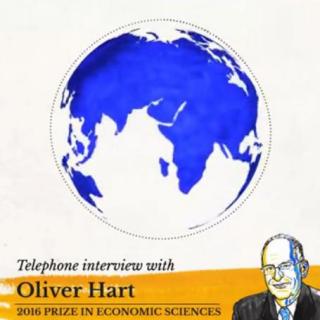
介绍:
Interview with Oliver Hart
Telephone interview with Oliver Hart following the announcement of The 2016 Sveriges Riksbank Prize in Economic Sciences in Memory of Alfred Nobel. The interviewer is Adam Smith, Chief Scientific Officer of Nobel Media.
Oliver Hart (OH): Hello.
Adam Smith (AS): Hello, this is Adam Smith, calling from Nobelprize.org the official website of the Nobel Prize in Stockholm, Sweden.
OH: Yes.
AS: Congratulations on the award of the Prize.
OH: Well, thank you very much, I’m absolutely thrilled.
AS: How did you hear the news?
OH: Well, I got a call at about, I think two minutes past five.
AS: And it woke you?
OH: Oh, I have to admit I was awake. I hadn’t been awake for long, but you know such is life. I think I woke at about 4:40 and was wondering whether it was getting too late for it to be this year, but then fortunately the phone rang.
AS: Gosh, what a thrilling feeling of excitement and relief then, when it came.
OH: Well, it was, yes, it was rather amazing.
AS: What was you first action after hearing?
OH: My first action was to hug my wife, wake up my younger son who is up for the weekend, so in the house, and then I actually spoke to my fellow Laureate, Bengt Holmström, who’s a friend of mine, a great friend of mine. You know, I knew he knew and I gave him a call, so we had a chat.
AS: Am I right in thinking in was your birthday yesterday?
OH: It was, yes, it was.
AS: That’s a nice present then, to receive, a little late.
OH: It’s a lovely present. Friends of mine said I have a decent shot at this for a few years and it’s always around my birthday, which actually makes celebrating my birthday a little tricky. This is always in the background, and that was certainly true yesterday. So it’s going to be, you know, one of the smaller benefits of winning the Prize, is in the future I will be able to celebrate my birthday without thinking about it. A minor thing, but still.
AS: Interestingly, you’re the fifth Laureate this year to have been born and educated in the UK, but then to have moved to the US.
OH: Yes, I noticed that. Yes, and that was true of the one last year. Angus Deaton was in that category too. I think it says two things. The British education system is really quite good, but certainly there was a period when the opportunities to actually develop one’s work were better in the US.
AS: Just one last question. This is for your contributions to contract theory, so it will introduce lots of people around the world to contract theory. What do you hope it brings to the field, the award?
OH: Well, I think contract theory…contracts are just an incredibly powerful way of thinking about parts of economics. I mean they’re just fundamental, the whole idea that trade is a quid pro quo, there are two sides to a transaction and that any transaction that you have in economics, whether it’s between a buyer and a seller or an employer and an employee or a creditor and a debtor, that the way the thing is structured, you know, is very useful to think of it as being done to increase efficiency, so both sides have an incentive to construct the transaction in the most, so that it generates the greatest value. You know, I mean, even a simple thing like people often think that one side dictates the terms to the other side. It may look like that but actually even then the side dictating the terms wants to choose terms which are acceptable to the other side and generate the most value because if there’s money left on the table then you can write a better contract, so in a way, it’s a very good side to economic transactions, and you see it through the design of the contract.
AS: Thank you.
OH: I don’t know whether that made any sense? I think it’s something that people truly lose sight of.
AS: It made a lot of sense. It was beautifully explained and especially beautifully explained so early in the morning after receiving such news.
OH: Well, that’s right. Well, I could do better later in the day. Thanks a lot, nice to talk to you.
AS: Congratulations.
OH: Bye bye now.
AS: Bye bye.
大家还在听

